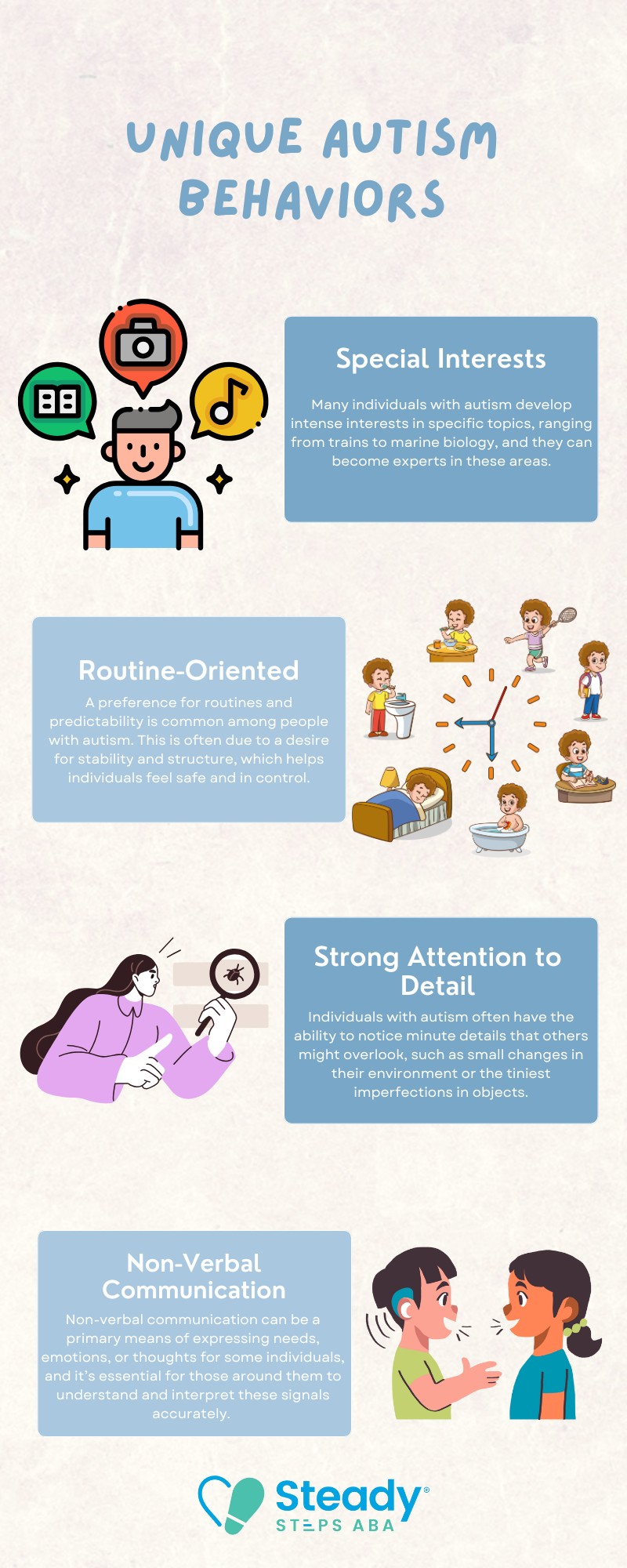Key Points:
- Autism Spectrum Disorder (ASD) is more common than you might think.
- Many people with autism have exceptional skills in specific areas.
- Understanding and supporting individuals with ASD can improve their quality of life.
Autism Spectrum Disorder (ASD) affects millions of individuals worldwide, and its impact varies from person to person. While the term “autism” might immediately bring up thoughts of challenges, it’s important to recognize the unique talents and abilities that many individuals with autism possess. Understanding fun facts about autism is an excellent way to help break misconceptions and broaden your knowledge about this spectrum of neurodevelopmental disorders.
In this article, we’ll explore some lesser-known facts about autism, ranging from the diverse abilities of those on the spectrum to the various ways they experience and interact with the world. These fun facts can help shed light on the complexity and beauty of autism, showing how understanding and support can make all the difference.
What are Some Fun Facts About Autism?
While they are often misunderstood, many people with autism possess unique abilities that can be seen as remarkable. Autism is a spectrum disorder, which means no two individuals with autism are alike. From mild to severe, autism encompasses a wide range of behaviors, abilities, and challenges.
Autistic individuals often display heightened sensory perceptions, such as exceptional hearing or the ability to notice minute details others might miss. Many on the spectrum can also develop talents in areas like math, art, music, or memory. These fun facts about autism demonstrate the richness and diversity of this condition.
Here are some more fun facts about autism:
1. Autism is More Common Than You Think
When most people hear about autism, they often don’t realize just how widespread it is. In fact, 1 in 36 children in the U.S. are diagnosed with an autism spectrum disorder, according to the Centers for Disease Control and Prevention (CDC).
This growing statistic has sparked awareness and led to a wider range of support programs and therapies. More than just a medical condition, autism is a part of a person’s identity, and it’s increasingly understood as a valuable part of our diversity.
2. The Incredible Memory of Some People with Autism
One of the fun facts about autism that often surprises people is the extraordinary memory abilities many individuals with autism possess. Some people on the spectrum are known to have photographic memory, also called eidetic memory, where they can recall details from their surroundings or a particular experience in incredible detail.
For example, many individuals with autism have a high capacity for remembering specific facts, numbers, and dates. This means that they might have a great aptitude for certain areas like mathematics, historical facts, or learning languages. These special memory skills often make them invaluable assets in fields requiring attention to detail and precision.
3. Sensory Sensitivity Can Be Both a Challenge and a Strength
Individuals with autism often experience the world in an intense way due to heightened sensory sensitivity. This means sounds, lights, smells, and textures might seem much stronger to someone with autism than to others.
For instance, some individuals on the spectrum might find the hum of a fluorescent light or the scent of a certain food overwhelming. However, this heightened sensitivity can also be a great strength. Many individuals with autism excel in environments where attention to detail is required, such as art, science, and technology fields. Their sensory awareness helps them notice things others might miss, making them excellent problem solvers and innovators.
4. Autism and Exceptional Skills
One of the most fascinating aspects of autism is the prevalence of unique and exceptional skills in certain areas. Some individuals with autism show remarkable abilities in subjects like music, drawing, or memory recall. These talents are often referred to as “savant abilities.”
For example, some autistic individuals are known to play instruments without formal training, or even create intricate pieces of artwork that demonstrate exceptional skill and creativity. These extraordinary talents are part of the reason why understanding autism on a deeper level is so important—it’s about appreciating the diverse range of abilities that individuals with autism can bring to the table.
5. Autism Doesn’t Always Mean Speech Impairments
A common misconception about autism is that it always involves a speech impairment. While speech delays and communication challenges are common among individuals with autism, not all people with autism experience difficulties with speech. Some individuals may speak early and fluently, while others may not speak at all.
Instead of focusing solely on speech, it’s important to remember that communication can take many forms. Non-verbal communication methods such as sign language, picture exchange communication systems (PECS), or assistive technology devices can help individuals with autism express themselves and connect with others.
6. Autism is Not Caused by Parenting
There’s a common misconception that autism is caused by parenting style or environmental factors. In reality, the cause of autism is still not fully understood, but it is believed to be a combination of genetic and environmental factors. No single cause has been identified, and there is no evidence to suggest that poor parenting causes autism.
Understanding this can be a relief for many parents, as it reduces the stigma and helps families seek the right resources and therapies without feeling blamed. Today, autism is increasingly recognized as a neurodevelopmental condition that requires support and intervention.
7. Unique Autism Behaviors in Everyday Life
Many individuals with autism display unique behaviors that help them navigate the world around them. Here are a few quirky and interesting facts about how autism influences everyday life:

How ABA Therapy Can Help
For those seeking to help individuals with autism reach their full potential, ABA therapy (Applied Behavior Analysis) is a widely used, effective method. ABA therapy helps people with autism develop essential life skills, including communication, socialization, and adaptive behavior. By reinforcing positive behaviors, ABA therapy provides a structured and supportive approach that can significantly improve the everyday lives of individuals with autism.
Ready to Get Started with ABA Therapy?
At Steady Steps ABA, we are committed to helping individuals with autism reach their fullest potential through personalized ABA therapy. Based in Maryland, we offer customized therapy plans designed to enhance communication, socialization, and daily living skills. Our team of experienced therapists works closely with both the individual and their family to create a supportive environment that encourages growth and development.
If you’re in Maryland and looking for top-tier ABA therapy services, we’re here to help. Get in touch with us and start your child’s journey to success today!





